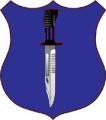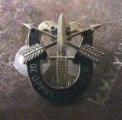Excellent response, since war and warfare are about the threat of, or the use of, coercion to make your opponent bend to your will, this proposed definition doesn't add much to the debate.Regular Warfare is the use of any means available to attrite, influence, and or exhaust an opponent in order to have him succumb to your will.
Will that do for the Regular Warfare definition?
I thought about using conflict also, but how can we define Al Qaeda's and numerous other irregular groups has having limited objectives? AQ is waging total war in an attempt to re-establish the Caliphate. If that is a limited objective, then what objective isn't limited?Conflict is defined as "an armed struggle or clash between organized political parties within a nation or between nations in order to achieve limited political or military objectives."
First, we do not conduct warfare during peace, we participate in warfare to bring about a desirable peace. Peacetime engagement conducted for numerous reasons falls short of warfare. IW is not restricted to other than war environments, in fact I can't think of any conflict where there was no element of IW being conducted in parallel or pre or post conventional conflict. When we say military activities favor indirecct and asymmetric approaches, we are presented with two problems. First the terms mean nothing and everything depending upon the audience. The indirect approach is over hyped and misleading. If you are in war, you still have to defeat the enemy, which probably means killing him. If we're helping someone else do it, then they still have to conduct direct approaches to defeat the enemy. The strategy for getting to the point where we direct power can be applied first depends upon controlling/influencing the relevant population, so they will identify the enemy (drain the swamp). However, that doesn't necessarily mean indirect."IW consists of actions conducted by the whole of government, typically in times of peace, to shape the struggle for legitimacy and influence with relevant populations. Military activities favor indirect and asymmetric approaches in a supporting role, though at times may require the full range of options."
The second problem is you are presenting a so called preferred solution, by stating "ususally favors". Every problem is unique, I think any definition should stay far away from proposed solutions. The goal is to understand the problem and then to develop an appropriate strategy to counter it.
IW consists of actions conducted by the whole of government to shape the struggle for legitimacy and influence with relevant populations.










Bookmarks